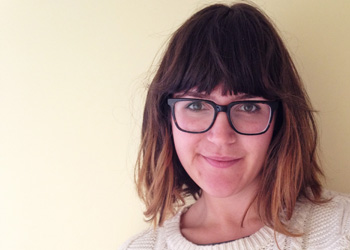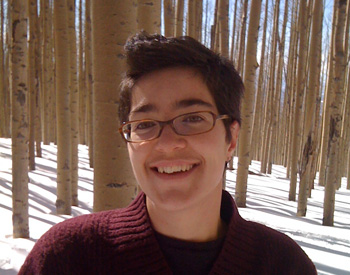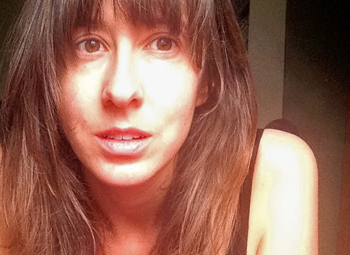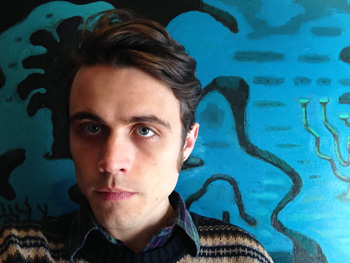Boston Review, in partnership with the 92nd Street Y Unterberg Poetry Center, proudly presents the winners of the 2015 “Discovery” Poetry Contest/Joan Leiman Jacobson Poetry Prizes. Now in its sixth decade, the contest recognizes and celebrates the achievements of poets who have not yet published a first book. Many past winners—including John Ashbery, Lucille Clifton, Mark Strand, and Ellen Bryant Voigt—have gone on to distinguished writing careers.
This year’s competition received more than 1,100 submissions, each of which was read carefully and anonymously by preliminary judges Camille Rankine and Boston Review poetry editor Timothy Donnelly. After much deliberating, judges Peter Gizzi, Atsuro Riley, and Susan Stewart awarded this year’s prizes to Jessica Fjeld (Boston, MA), Jenny George (Santa Fe, NM), Margaret Reges (Iowa City, IA), and Kit Schluter (Providence, RI). The judges praised the strength of the entries overall and noted the inventiveness, insightfulness, and variety of the poems. The four runners-up are Kenzie Allen (Ann Arbor, MI), Becca Liu (Austin, TX), Beth Seetch (Easton, PA), and Jeanne Vanasco (Brooklyn, NY). Winners read from their work at the Unterberg Poetry Center in New York on May 4, 2015. See here for more details.
The Coffin Star
by Jessica Fjeld
The best thing I did last week was
sit in a chair while blood leaked out of me
in a non-traumatic way
It is just a normal thing
in this kind of universe where
you can say anything you want
then cover it up with moans
Like how I was kicking around
in the chalky dirt of a field
on a hill in the sunshine
The arid grass full of insects
and there in the dust
alongside some improbably small wild strawberries
were scattered precious stones
freshly cut and candy colored
Obstacles to Handling
by Jenny George
“Many common elements of the processing
system present obstacles for the livestock.”
Rustling cloth.
Sun glinting off a metal bar.
A hallway that turns at a right angle.
A man in an orange hat standing in a new place.
The clanking of chains.
Shadow of chains hanging.
A rod coming toward the front of the neck.
The fears become large; they rise
from their objects and enter space
like a kind of halo.
And at the center, a monument
of pure stillness, an uncrossable field . . .
A hose hissing.
A gap of more than four inches.
Darkness coming out of a hole in the floor.
Horse
by Margaret Reges
There is a horse running on a white field, the field darkening into scrap branches and packed dirt, and the rim of frost at the edges of dead grass.
There is a horse with mouth open, there is the lip pulled tight over the teeth, there is a horse aching with its mouth parted, the hooves deep in the frozen sedge.
There is a hole at the neck, opening, there is no rider, there is an empty saddle, there is the bit and the strap loose, torn from the mouth, there is a fleck of foam at the mouth, and the flanks lathered in sweat, the neck lengthening.
The skin at the neck parting, the black calloused holes opening, the bit and the rein, the fence and the sedge, the flesh at the top of the hoof opening.
And the neck breaking, tar-black, the holes widening as the horse arches its neck, the hide on the ribs and flanks, opening.
And the whole of the field and the blank grass, and the eyes the soft orbit of glass, the glass dull with frost, the eyes unblinking, and frost at the lashes.
There is no rider and the breath in clouds, the throat widened into black ropes, black ropes and a white cloud and the catch of dark.
All along the field the ice edging into the throat, and the hoof on the packed turf like a blow to the chest, as if cracking the chest, and the sound of the breath seizing in the hair, blistered particles of ice.
Bad Faith
by Kit Schluter
1.
Into the bulbous crenelation of foliage I raise my star-shaped finger.
Without softness, the story perspires a sweetlessness, axillary as any
latterday bubo.
Under my clothes, the skin coughs—it weeps a filthy amber, the color of
overused motor oil.
Between myselves, one soul feels too plastic—as long as there is at least
a gust of light, there will be some contour, some give, to the others.
The natural world is lobotomized: its hair grows long, turns to gold, falls
away,
and when my skull gets critiqued, rightfully, for taking after centuries-old
copper bells, it cracks under this stress in the atmospheric night.
No matter which shrub I choose to lie in, I tend to find another with
binoculars tight to his eyes, fixed on some window, a body halted in its frame.
2.
What is an opulent form without a function: or, what is an adverb?
What is the perfect use of the word needlessly, and what can I use to
dowse for paranoia's nearest underground spring?
I awaken to the possibility of my having no such hydrosphere, the brighter
half of my chiaroscuro egging me to passive receiving.
There is no rhyme fit for my scream: my scream is ever petty, a sword-
crossed, double chiaroscuro—a crosshatching of trusts.
The normative is pedagogical, but only in high, high relief.
3.
I never skimp on the food I shoplift—but is there a name for slinking away
from the inexpensive perimeter, like this, to the decadent aisles?
And if a tree is named alone in a wood, can it be felled and dragged to the
town square, if there is no one to drag it there?
There is nothing inconvenient about it, this disappearing—this falling away
of the ground from which an argument gleans its blinding charm.
I am an individual, thus I have no bedtime.
4.
To derive my daily intake of sentencing from ought, my narrative scorn
from is, I first consider illegibility as impossibility, then as joke, subterfuge, and
finally, foil.
In the interim, I ask my imagination—
a vehicle, anyhow, hijacked by others—
to stop, drop me off, let me document it from the outside, with a sketch or
a photograph, a field recording. When no one's looking, I key its exterior, I spill
my name over its windows in etching liquid. Then I get back on as if nothing has
happened, and fall asleep until I've missed my stop, high above the rainy city.
Landscapes are without end: nothing can be read, lest reading become
sacrifice.
To rely too heavily on a single language: to cleave the interval between
two.
5.
At the heart of the fingertip's whorls begins a mouth.
From this whorled mouth a cone arises.
At the base of this mouthed cone there wells up a pressure.
Out of this coned pressure eeks a thread.
With this pressured thread is tied down a purple.
Under this threaded purple a garishness struggles.
Because of this purple garishness there clots a clotting
In this garish clotting a well is drying up.
Now, dangling in this clotted well, a bag of fluid in sunlight.
6.
In an instant, I am going to tell you how I rely on things outside myself.
In an hour, I may have decided to lose myself to the steam instead.
In a day or two—how aberrant this flipping and flipping…
Light that falls and sweeps my last anxiety out over the water from the
cliff's foot.
The sand fanning out over the plague.
Lapsed, relapsed, prolapsed, eight to nine years away from that insidious
basin at the foot of a waterfall,
in the heart of the crease denoting my opulence.
7.
If I believe the concept of the ornamental would disappear given a minor
adjustment of attention, it must be because I sense something essentially ornate
in my own being here:
a chain that ligatures a fire hydrant's cap to its open, bursting mouth,
a flier depicting a face that can no longer be recognized as a face.
Today I read of a name that resisted obliteration—the name as a site of
paradise.
And I read of the name as a frill—under a window in a labyrinth, stony and
vain, with a hot, soapy bath waiting at its center.
All I ask of life is that it pose me in its question to myself—like this, the my personality can only hit me at a glance.












